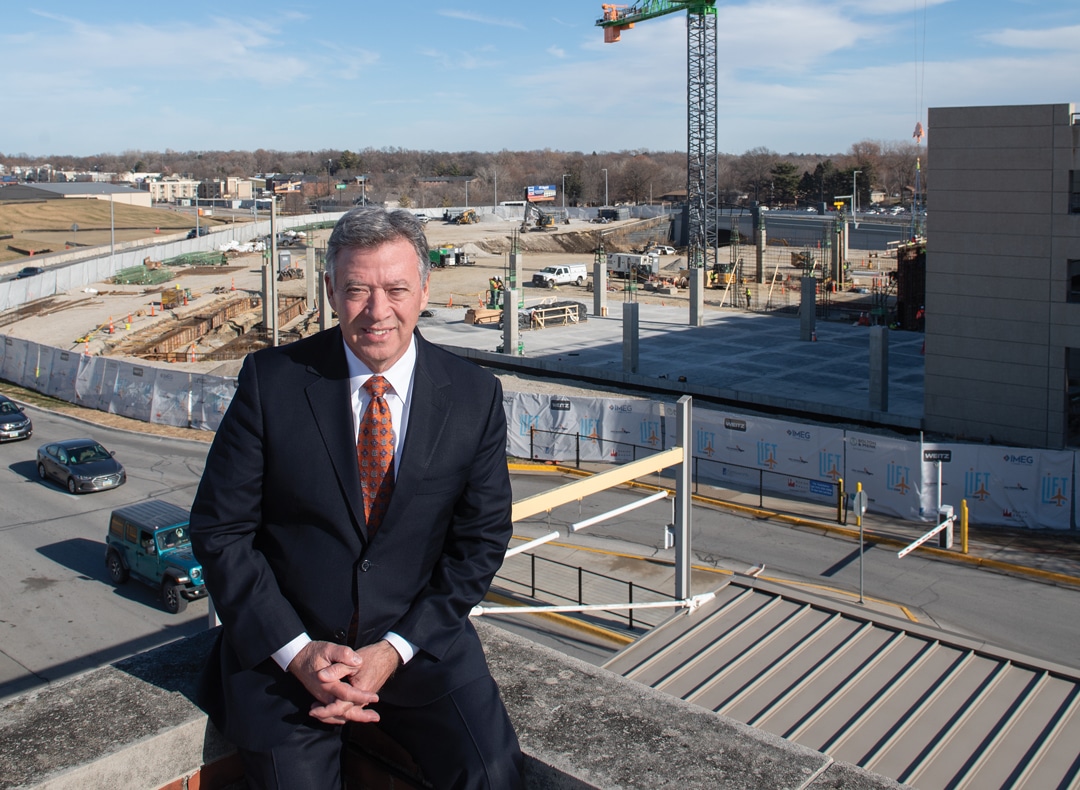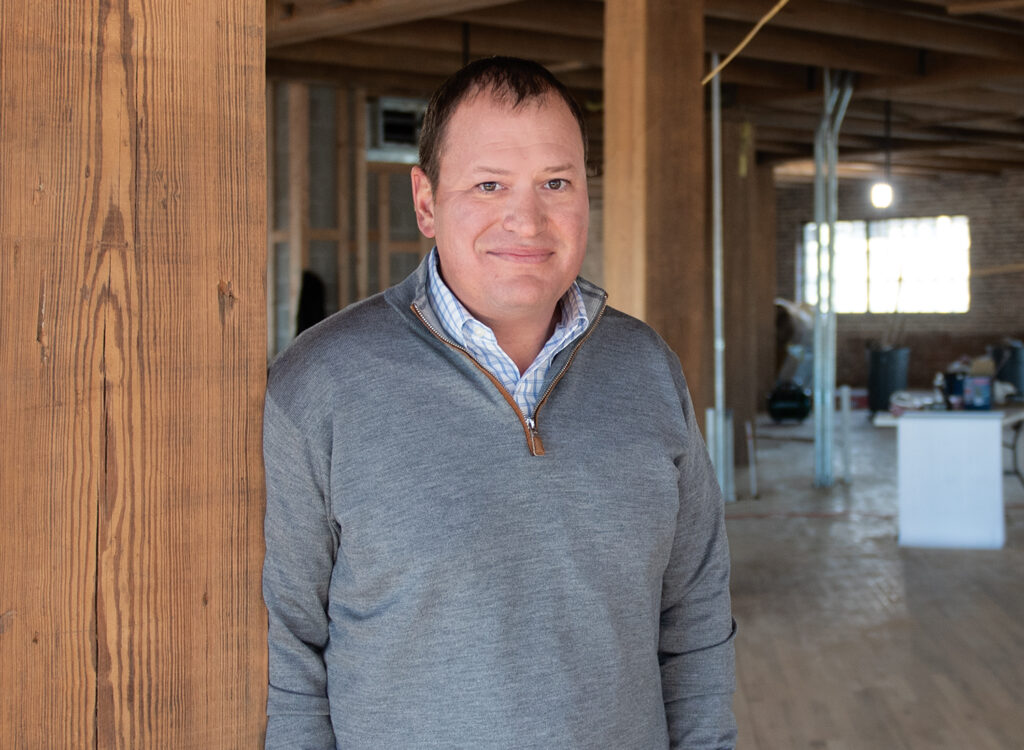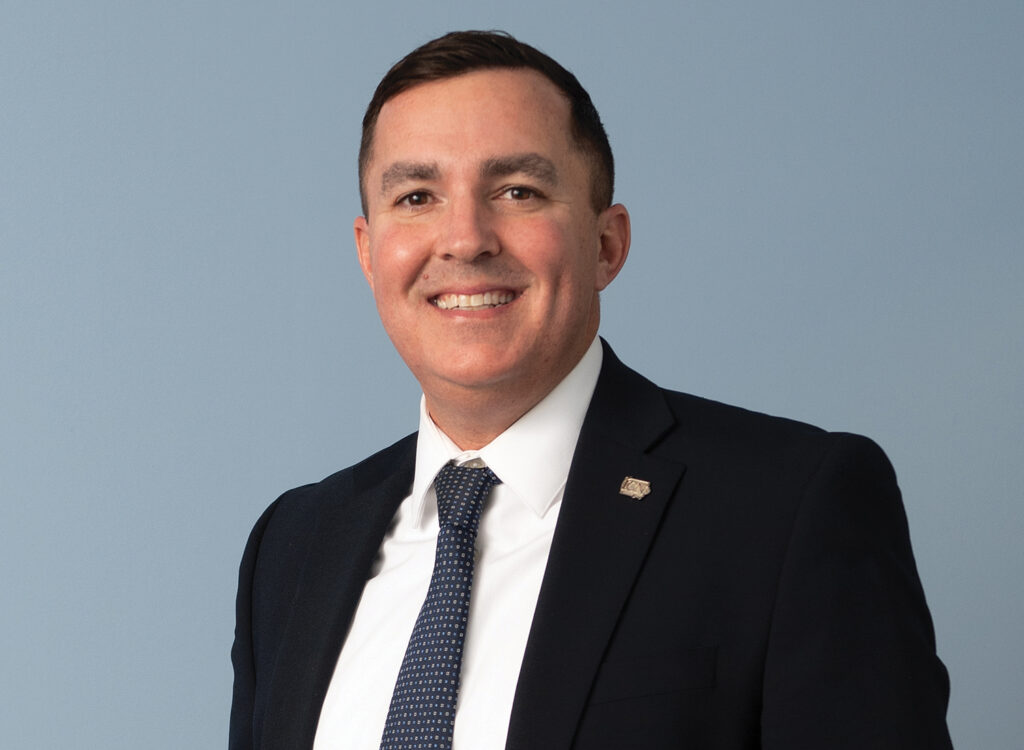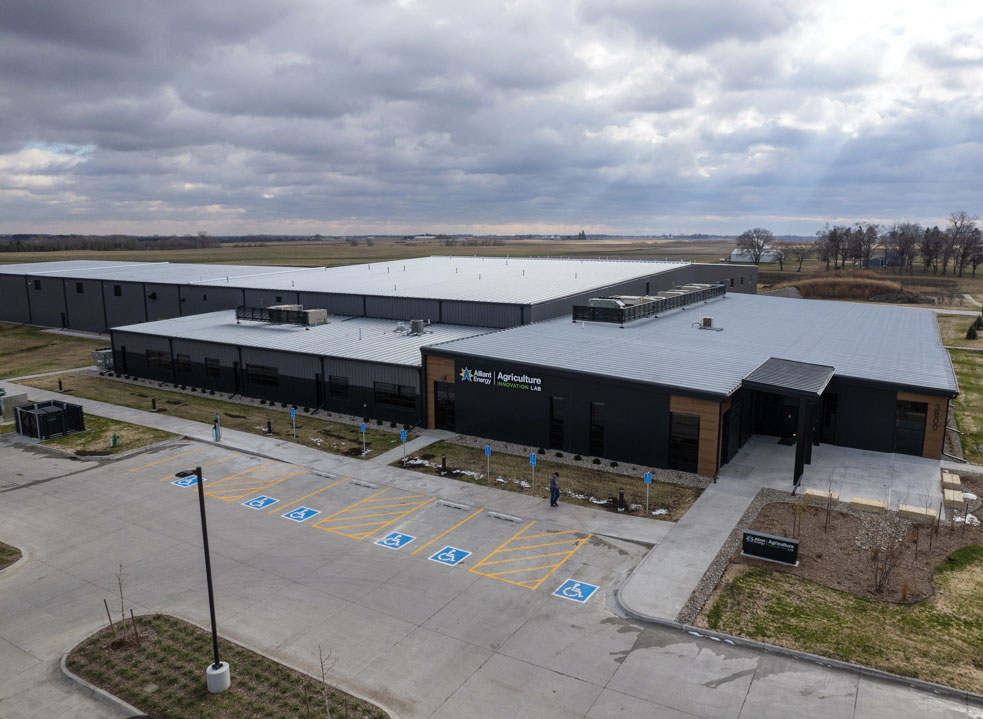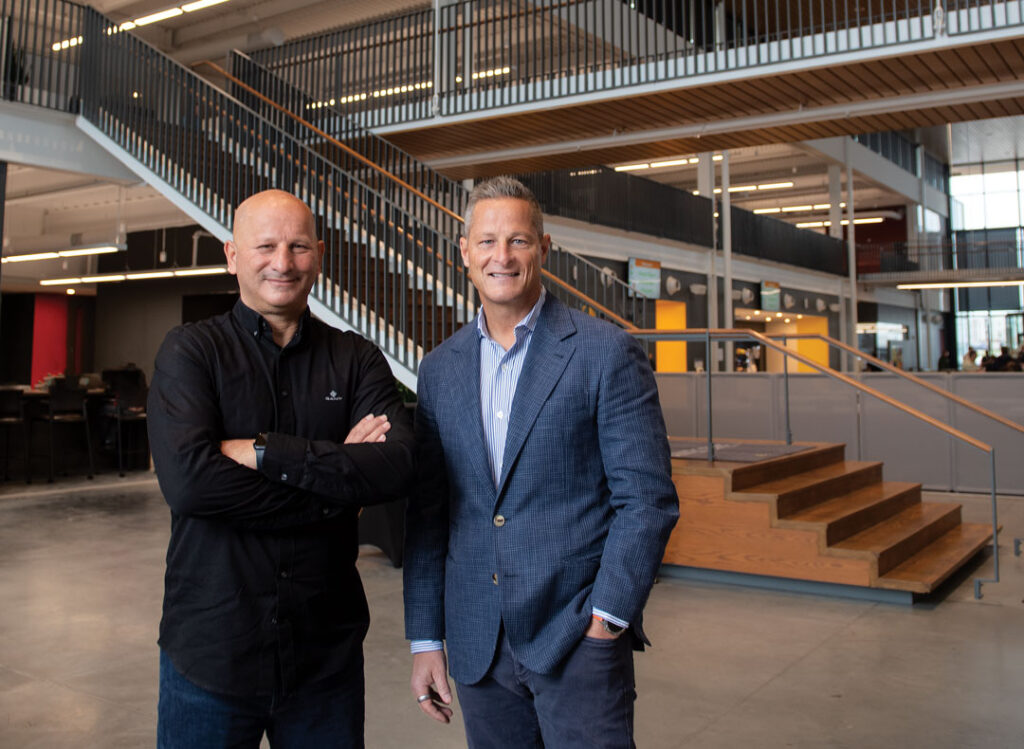BPC’s 2023 News Changemakers talk about their goals, strategies for the future

Business Record Staff Dec 29, 2023 | 6:00 am
34 min read time
8,050 words20|40, Business Record InsiderIt took Des Moines International Airport officials and the city’s business and civic leaders five years of campaigning and educating the public on what an expanded facility and new terminal could do for the region before a $350 million bond referendum was ready to go to voters this year.
Nearly 80% of voters who participated approved. The outcome will be apparent in the near term and possibly for decades – an estimated $75 million in savings for the parking garage expansion and new terminal. That means more gates to allow more flights into a busier Des Moines airport.
The airport’s executive director, Kevin Foley, told the Business Record the day after the Nov. 8 election that the voters’ decision “adds additional ammunition for us to go to additional government entities, specifically federal and state, and say, ‘Hey, look, we’ve got all the support in the world. Your constituents are saying this has to get done.’”
Stories like these bring change to Central Iowa, and the people behind them are changemakers.
On Dec. 13, Business Publications Corp. awarded our inaugural News Changemaker Awards for 2023. The 18 finalists and six winners where honored as part of the company’s 20|40 event to celebrate the 20th anniversary of dsm magazine and the 40th anniversary of the Business Record.
The finalists were selected by Business Record and dsm magazine readers through nominations, and more than 1,000 votes were cast to determine this year’s winners. The awards recognize people and organizations making headlines in business and culture.
We asked our finalists to reflect on their legacy, explain their strategies for success and look toward the future. This issue of the Business Record features these changemakers in their own words.
— Mike Mendenhall, Business Record associate editor
Business Leader — Legacy
This award recognizes a Des Moines-area business leader who has retired, plans to retire in the coming year, or is transitioning from their leadership role, for their outstanding career accomplishments and track record of community involvement.
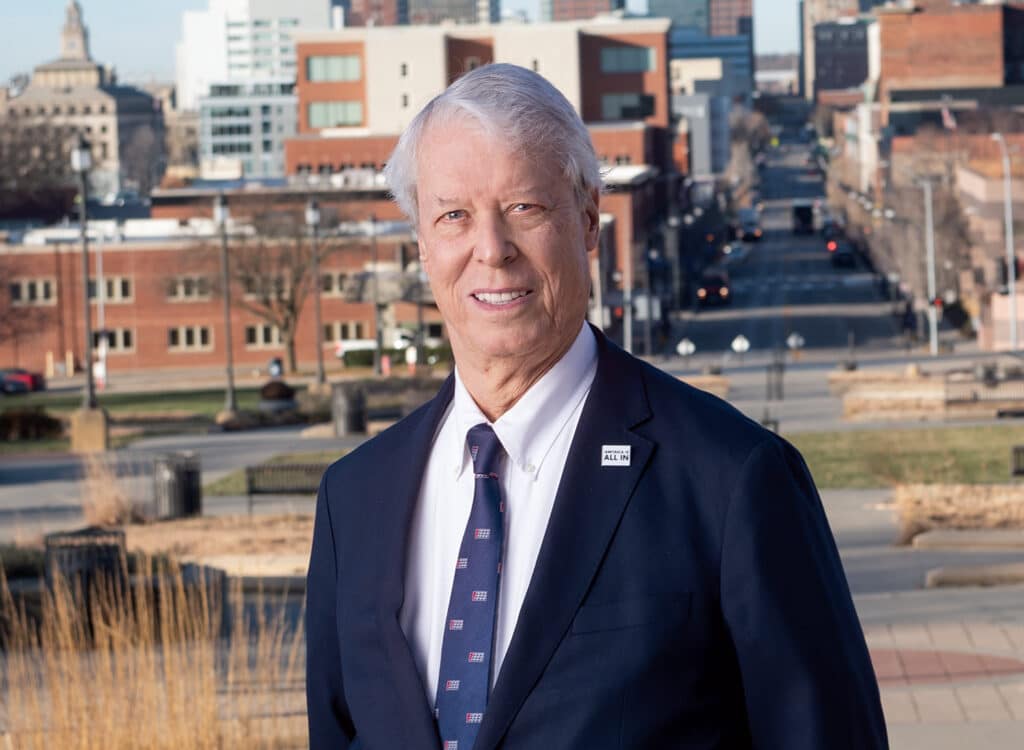
Winner: Frank Cownie, mayor of Des Moines
After serving as mayor of Des Moines for 20 years, Cownie chose not to seek reelection. His tenure was noted for an increase in city park access and a focus on environmental issues. He was first elected mayor in 2003 and took office in 2004. Since then, he has helped lead downtown growth and revitalization and efforts to increase residential housing downtown. He is also known for his environmental work and increasing access to city parks. Cownie, 75, said it was the transparency, communication and collaboration of the city, business owners and residents that have led to the revitalization of downtown, making it an economic hub for Iowa and the region. It’s that convening of groups that he credits for Des Moines’ growth and for positioning the city for continued growth in the future.
Question: Which accomplishment(s) from your 20 years as mayor do you expect will have the most lasting effect on residents and the city’s ability to grow?
Answer: There’s a lot the city of Des Moines has done over the past 20 years to make our community somewhere people want to live, work, play and raise a family. We’ve intentionally revitalized and supported all neighborhoods, including the downtown core, which is now nationally recognized for its balance of employers, residents, entertainment, shopping and dining. We know that more and more individuals are looking for quality of life and leisure opportunities when choosing where to live. The city has filled this need with initiatives to ensure all residents live within a 10-minute walk of a park to create a resilient city that is safe and forward-thinking about climate change. I look back on my 20 years as mayor, and I feel pride in how I’ve led the city into becoming “where it all happens” to attract and retain residents.
Question: How would you define Des Moines’ economic future and position among its peer cities in the coming decades?
Answer: This question is clearly answered by the many accolades the city has garnered over the past few years. We’re the best place for young professionals; the best mid-sized metro for millennials; and amongst the top in terms of the best job market for recent graduates, the best place to start a business, the best place to live for families, and the most affordable housing market. We are attracting a young workforce. The real question will be how do we keep this generation and their kids and grandkids in Des Moines. I believe it will be contingent upon education. I would like to see the city continue to find ways to partner with our local colleges and universities to develop a new generation of business owners and leaders. If we can keep these residents and this workforce, we can continue to expand upon the things that make Des Moines the best place to live and guarantee continued economic growth.
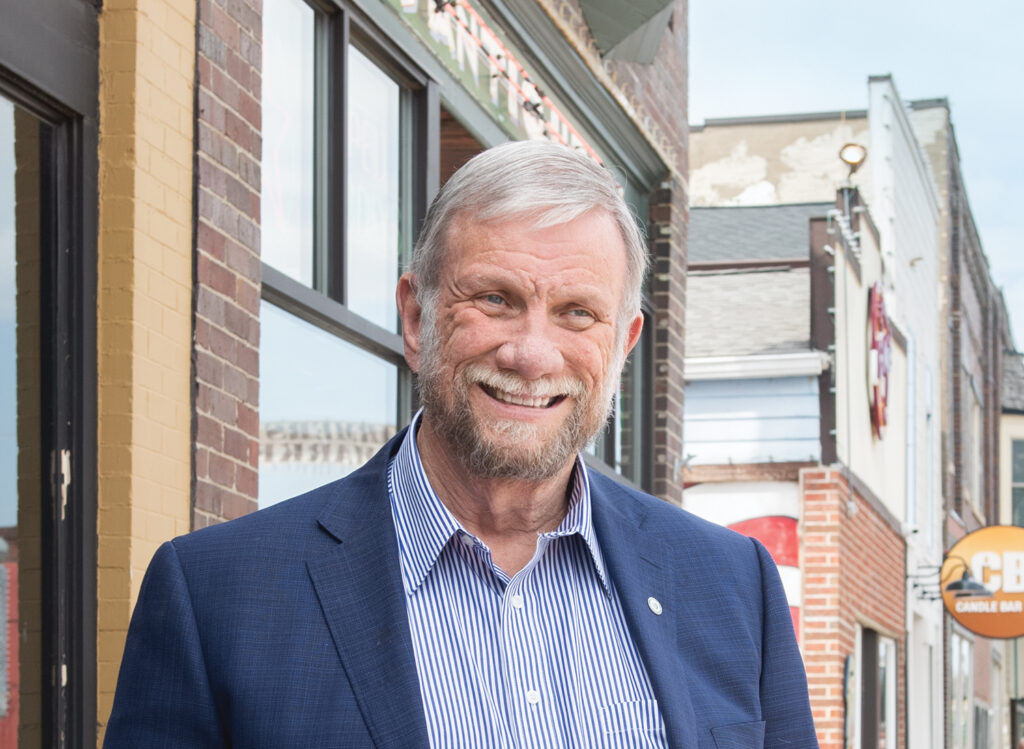
Finalist: Clyde Evans, community and economic development director, city of West Des Moines
Evans retired in July after 32 years with the city of West Des Moines. He oversaw several major development and redevelopment efforts during his tenure. Evans grew up in Illinois and graduated from Ball State University in Indiana. Work in community planning took him to California, but by 1991, Evans and wife, Sharlyn, were ready to return to the Midwest to raise their children. Evans was hired as West Des Moines’ community development director that year. During Evans’ tenure, West Des Moines’ population more than doubled to over 71,600 residents. Jordan Creek Town Center, Iowa’s largest shopping complex, opened. Microsoft Inc. built five data center farms in the city and several large companies, including Wells Fargo, have developed corporate campuses.
Question: What did the city of West Des Moines get right during your 32 years as economic development director that allowed it to nearly double in size?
Answer: I think that one of the biggest things that the city did was invest in infrastructure. When we would have a major development project, like one of the Microsoft Data Centers, the city, by use of development agreements with minimum assessment agreements, would leverage the value of the development to finance the construction of infrastructure. That has allowed the city to construct hundreds of millions of dollars of public infrastructure like streets, water and sewer lines that the city could not have afforded otherwise. By doing that, the city has been able to open up hundreds of acres for new development.
Another thing that worked well for us was always trying to think outside the box for solutions to problems. That “can do” attitude allowed us to be considered the go-to community, so it gave us a leg up in landing projects.
We always looked at development as a partnership and not as an adversarial relationship.
Question: In today’s work culture, 32 years is a long time to stay with an organization, especially in the same role. What about leading West Des Moines’ economic development efforts captured your interest and enthusiasm for three decades?
Answer: There was always the next “once-in-a-lifetime project” that kept us busy. When you have so much new development and redevelopment occurring, it makes the job fun and interesting. You can see the results of your hard work on a project by it getting built.
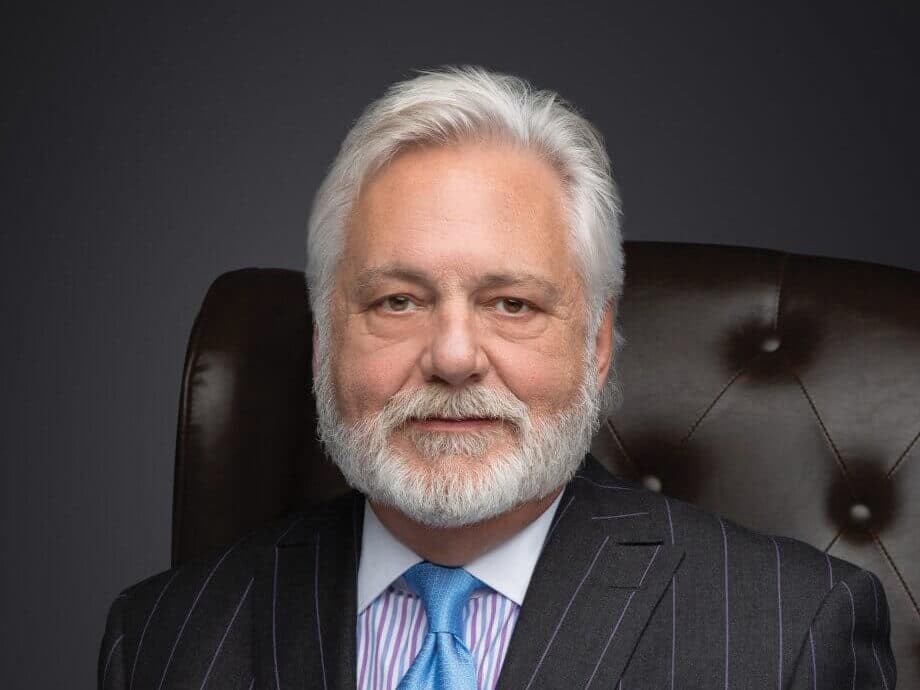
Finalist: Scott Packard, chairman, Wright Service Corp.
Packard retired as CEO of Wright Service Corp. after nearly 21 years in the position. The company grew from 1,000 to 6,000 employees under his leadership. He will continue as chairman through 2026. He joined Wright Service in 1998. After three years, John R. Wright appointed Packard president and COO. By 2002, he was chairman and CEO. Packard started his career after graduating from the University of Kentucky with a bachelor’s degree in accounting.
Cultural Leader — Legacy
This award recognizes a Des Moines-area cultural leader who has retired, plans to retire in the coming year, or is transitioning from their leadership role, for their outstanding career accomplishments and track record of community involvement.
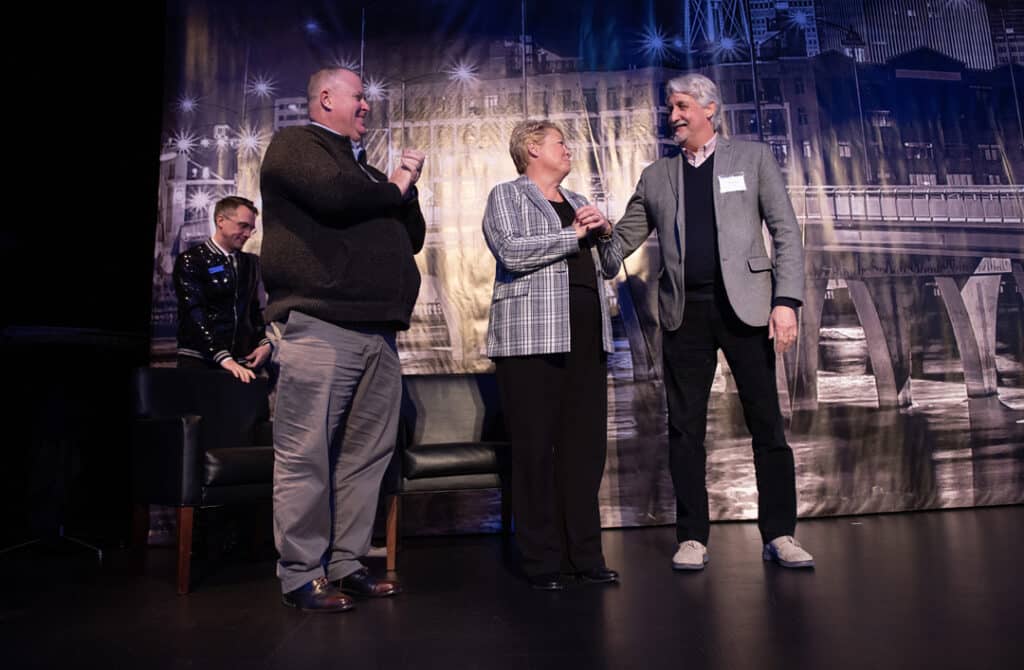
Retiring Iowa PBS Executive Director and General Manager Molly Phillips, center, is honored with the Cultural Leader – Legacy News Changemakers Award on Dec. 13 at Business Publications Corp. Inc’s 20|40 Celebration at Prairie Meadows Racetrack and Casino. She’s joined on stage by award finalists Mark Wyatt, left, and Jeff Fleming. Photo by Duane Tinkey

2016 photo of Molly Phillips
Winner: Molly Phillips, executive director and general manager, Iowa PBS
Phillips is retiring from Iowa PBS after 34 years with the organization, the last 10 in her current role. Iowa PBS has thrived under her leadership, a time that included its 50th anniversary. During Phillips’ tenure, Iowa PBS expanded its programming and responded to new trends in broadcasting and technology, including the addition of PBS Kids programming and YouTube channels; multiple livestreams and on-demand viewing. She helped lead an organizational rebrand at the network and earned dozens of national awards and regional Emmys.
Question: How have the expectations of Iowa PBS viewers and media trends changed in your 34 years at the organization and how has that shaped what Iowa PBS is today and plans for the future?
Answer: Everyone in business today knows how significantly technology advancement affects product or service delivery. When I started at the network, our service delivery was specific to broadcast. Today, Iowa PBS viewers rely on us to provide “on demand” options that allow them to watch where they want and when they want. We continue to broaden our online offerings to meet Iowans’ expanding interests and preferences, reaching them on more than a dozen platforms including Facebook, YouTube and the PBS app. Nearly half of the households in the Central Iowa viewing area alone still watch Iowa PBS each month through traditional TV. At the same time, our fans made us the second public television station in the country to reach 100,000 YouTube subscribers. The next big thing to come to television viewing is NextGen TV, which brings a long list of service enhancements as it rolls out across the country.
Question: What’s one goal reached while you were at PBS that you hope will leave a lasting mark on the organization and the state of Iowa — and why?
Answer: One of my first goals as executive director and general manager was to make Iowa PBS the home for Iowa Girls High School Athletic Union Championship games. We are celebrating ten years with IGHSAU this year. I am as proud of our excellent coverage of championship volleyball, softball, soccer and basketball as I am of the outstanding accomplishments of the Iowa high school athletes we cover. That service, and the level of that service, separates us from any other media serving Iowa. While I did not envision this result at the beginning, I also believe we have helped to elevate not just the potential of Iowa’s amazing female athletes, but also of future Iowa leaders. I often tell people that we change lives everyday at Iowa PBS. Our coverage of girls’ sports is just one of the ways we work to have a positive impact on Iowa’s future.
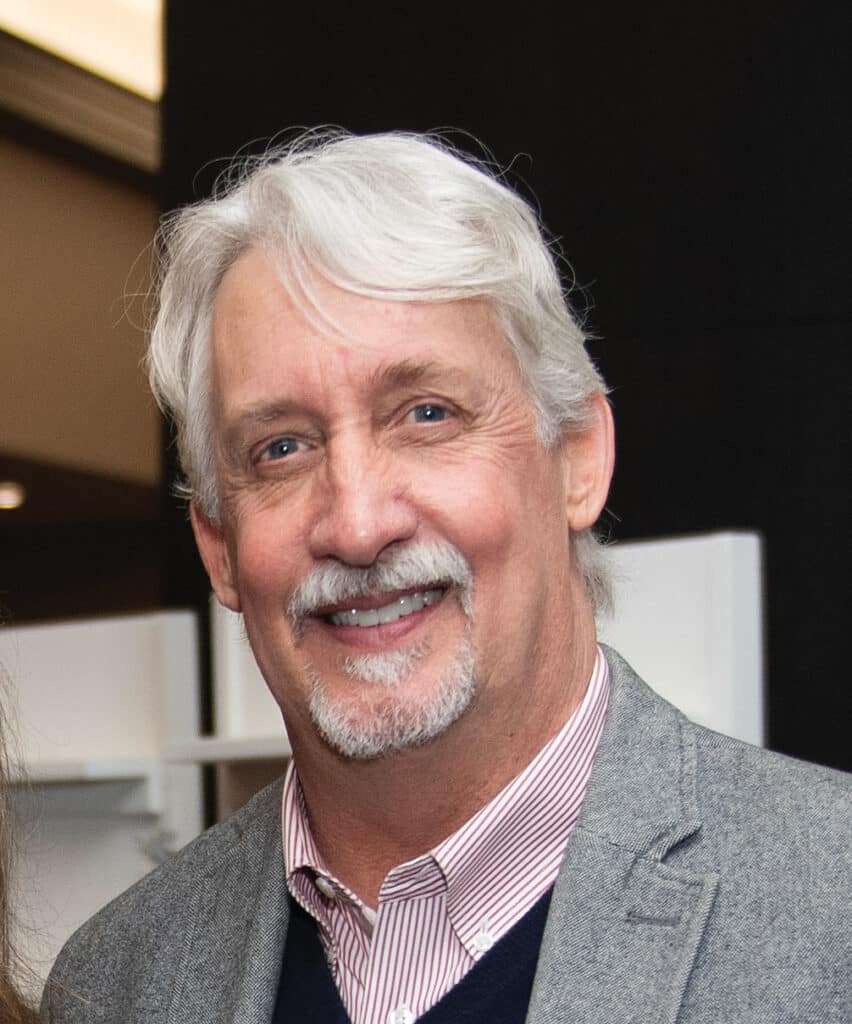
Finalist: Jeff Fleming, director, Des Moines Art Center
Fleming retired after 25 years at the Des Moines Art Center, the last 18 as director. Among his numerous accomplishments was the creation of the Pappajohn Sculpture Park. Fleming joined the Des Moines Art Center as a curator, followed by stints as senior curator and deputy director before being named director in 2005. He has been nationally recognized for the art center’s focus on presenting the first one-person museum shows in the United States for younger national and international artists. The permanent collection grew to around 6,000 works and became more diverse not only in terms of artists but also in forms of media. He retired in 2023.
Question: How has the perception and prominence of art’s role in the Greater Des Moines community and culture evolved in the time since you began your tenure at the Art Center? What do you foresee for the future?
Answer: I hope that the business and government sectors as well as the community at large have witnessed the social and economic benefits that the arts and arts organizations can contribute to a community. A great city has great cultural organizations. And I only see these benefits increasing in the future.
Question: What is a goal reached while you were at the art center that you hope will leave a lasting mark — and why?
Answer: The creation of the John and Mary Pappajohn Sculpture Park in downtown Des Moines transformed the cultural, social, educational and economic landscape of the city. Can you imagine Des Moines without this park now?
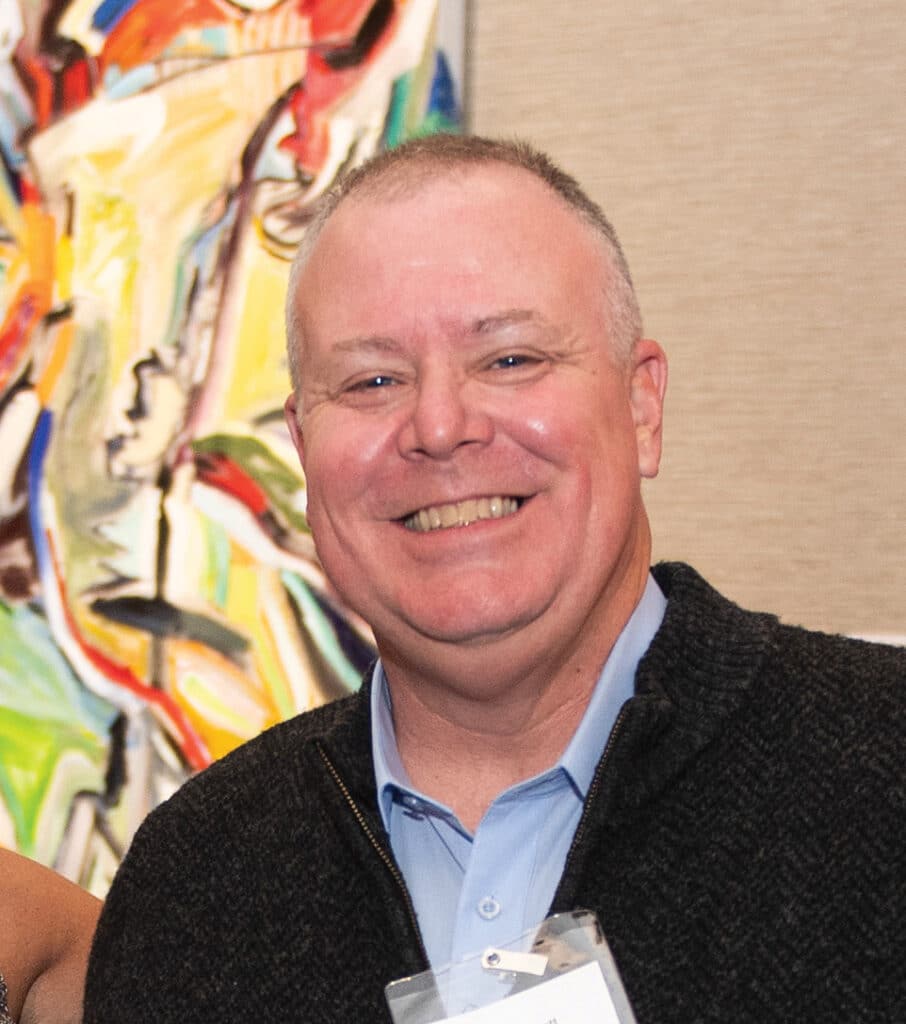
Finalist: Mark Wyatt, executive director, Iowa Bicycle Coalition
Wyatt announced his retirement from the Iowa Bicycle Coalition in July, an organization he helped start and for which he served as executive director since 2006. During his tenure, Wyatt worked with the Legislature, the Iowa Department of Transportation and community partners to expand the state’s trail system, bring more people to bicycling, elevating awareness of bicycling as a healthy activity and making the state’s roads and trails safer for cyclists.
Question: Cycling has become a part of Iowa’s identity both inside and outside of the state. What has the sport and cycling as a recreational opportunity done for the state’s economy? What needs to be done, including the buildout of Iowa’s trail network, to grow the sports’ benefits even more?
Answer: The simple but effective answer is infrastructure. We can work on policies and education, but trails and bike lanes are the biggest attractor for new bicyclists. And, it is more than building out long-distance recreational trails. The Great American Rail-Trail across the United States and Iowa is exciting, but we also need to remember underserved areas like Des Moines’ south side, where trails don’t exist. Bicycling thrives when it becomes the convenient choice for transportation.
Question: What is a goal reached while you were with the Iowa Bicycle Coalition that will have a lasting impact on the organization and Iowa — and why?
Answer: In addition to millions of dollars invested in infrastructure, I would point to our work on distracted driving. The coalition brought language to then-Iowa Gov. [Terry] Branstad on distracted driving. We made texting and driving a primary penalty, but we specifically spearheaded the effort to make fatalities caused by texting to have the same penalty as drunk driving, drag racing, and eluding police. In addition, we added distracted driving as a required topic to driver education.
Business Story of the Year
This award recognizes a notable story of a company’s, organization’s or business leader’s success and achievements that have made a significant positive contribution to the region’s economy.

Vertical construction is underway on a $50 million expansion of the Des Moines International Airport’s parking garage. The work is part of the first phase of a broader project to build a new terminal at the airport to handle increased passenger and airline traffic. Photo by Duane Tinkey
Winner: Des Moines International Airport breaks ground on expansion
The Des Moines Airport Authority broke ground on its terminal expansion and received an affirmative bond vote from the community. Airport Executive Director Kevin Foley and the Des Moines International Airport Authority have navigated the plan to expand the airport, including the new terminal and the expansion of the parking garage. Foley and other airport officials said the improvements are an integral component to continuing the economic development momentum the region has seen in recent years. The airport received a big boost in November when Polk County voters overwhelmingly approved a $350 million bond issue to help fund the first phase of construction of a new terminal. The airport celebrated the beginning of construction on a new terminal with a groundbreaking ceremony this fall. Completion of the first phase of the new terminal is planned for fall of 2026.
Question: Des Moines International’s goal with the airport expansion is to accommodate a growing metro area population and air passenger traffic. What will it mean for availability and frequency of flights to major and regional designations? Could it draw international commercial flights to Des Moines?
Answer: The new terminal will provide space for additional flights to new and existing destinations and provide space for new airlines to enter the market. Additional flights and destinations create competition and lower ticket prices. International flights require additional space for operations. That space has been reserved but no build out at this time. If an airline wants to begin international service in DSM and the federal inspection service agrees to handle the flights, the space will have to be built out. So, yes, we anticipate international commercial flights.
Question: What is expected to be the ancillary impacts from an expanded Des Moines airport in terms of economic development and quality of life for Central Iowa residents?
Answer: Throughout history, travel has been necessary for economic expansion. If you look at where economic growth has taken place, it is where passengers and cargo have access to the current mode of transportation that is in vogue. New flights and destinations allow more travel into and out of DSM, new business, new leisure opportunities and improved quality of life.

BLK & Bold Chief Marketing Officer Rod Johnson, left, and CEO Pernell Cezar. Photo provided by BLK & Bold
Finalist: BLK & Bold named one of America’s fastest-growing companies
BLK & Bold, a 100% Black-owned, nationally distributed coffee brand, was within the top 100 of the prestigious Inc. 5000 Fastest-Growing Company List. BLK & Bold grew by 7,404% between 2019 and 2022, also making it Iowa’s fastest-growing private business during that time period, according to Inc. 5000’s 2023 list. Co-founded by Pernell Cezar and Rod Johnson, BLK & Bold started as an online-only business in 2018 but now has products in over 8,000 retail stores, including Target, Walgreens, Albertsons, Safeway and Hy-Vee. The company has partnerships with Marvel and the NBA. After gathering $22,000 in bonus checks from former jobs to start the business, BLK & Bold’s revenue grew to $8.5 million in 2020 and was projected to reach $12 million in 2023, Johnson told Axios Des Moines in September.
Question: What is BLK & Bold’s plans for future market reach, product and production asset expansion? What do you love about the coffee business?
Answer: Cezar – Growth for a bootstrapped business is synonymous with survival. We have been very lucky in our journey to have received such tremendous support from our community and we really want to hone in on continuing to make an impact through coffee. As for product expansion, the goal is always to come to the table with products and flavors that lead with quality. Coffee is the second-highest consumed beverage in America, and we want to provide specialty coffee at affordable prices to those who may not have the resources or means to explore coffee shops around the nation, all while giving back to the same community we hail from.
Johnson – BLK & Bold envisions a future that transcends the realms of coffee, aspiring to extend its impact beyond the cup. What resonates in the coffee business for BLK & Bold is our dedication to curating a meaningful experience, with sustainably sourced, specialty-grade coffee designed to elevate rituals and highlight the diverse flavors within our profiles. We see coffee as more than just a beverage, but more of a connector, a shared experience that brings people together, and that is what we love about it.
Question: What challenges did BLK & Bold encounter when it was founded to get exposure and scale in a niche segment of food manufacturing, and how did you overcome those obstacles?
Answer: Cezar – We had no experience being entrepreneurs and no access to capital because we were too early in our journey to qualify for a business loan. We relied heavily on credit cards to get our initial equipment and started out in my garage with a tabletop roaster. Through it all, our persistence and commitment to the vision, to doing something bigger than us kept us going. Receiving our first national purchase order from Target less than three years after we started our business was really a milestone for us in overcoming obstacles by getting into retail.
Johnson – The most glaring challenge for entrepreneurs, especially new ones, is raising capital or just having the funds necessary to bring the idea to life. Despite our limited experience and funds, we were able to make our place in the hearts of our community through our intentional social impact model, before we ever hit the shelves of retailers. A huge contributor to overcoming our initial challenges has always been the support and love BLK & Bold has garnered.

Finalist: Greater Des Moines Partnership navigates successful leadership transition to new CEO Tiffany Tauscheck
The Greater Des Moines Partnership, the largest local economic development organization in the metro, completed a seamless CEO transition. Tauscheck replaced former CEO Jay Byers, who was named president of Simpson College. She joined the Partnership in 2015 as chief operations officer after working for nearly eight years as vice president of marketing and development for Catch Des Moines and helping found the Des Moines Downtown Chamber of Commerce. Tauscheck, a former television reporter for KDSM FOX 17 and KGAN CBS2 and former ballet dancer, told the Business Record in 2021 that her love for downtown grew after working in it for more than 20 years.
Question: The Partnership has grown in recent years both geographically and its role in Central Iowa economic development. What are your vision and goals for the organization’s reach and mission in the coming decade?
Answer: In our extensive conversations with business and community leaders, small businesses, city leaders and elected officials throughout our 11-county listening tour, one of the major themes that came up over and over was the importance of being a premier economic development organization and continuing to ensure our region is a magnet for talent. Our region has been successful for the past several decades because of our ability to work together across jurisdictional boundaries, and that will be even more important to our continued economic development growth and talent attraction success in the coming decade.
Question: Moving into a post-pandemic world, what are the biggest challenges and opportunities for the Partnership?
Answer: Another theme we have heard in our conversations is the opportunity for further bridge-building between urban, suburban and rural communities. There is an appetite to increase collaboration even further, and we can be the conveners in our 11-county region.
Cultural Story of the Year
This award recognizes a notable story of a nonprofit, cultural organization or cultural leader’s success and achievements that have made a significant positive contribution to the community.

Winner: Easter Lake project announced
Easter Lake’s new recreation site will be one of the most universally accessible waterfront parks in the country. The Athene North Shore Recreation Area project at Easter Lake Park was designed to be a universally accessible waterfront with features to make the beach and activities like canoeing and rowing available to all. The process used to design the space, which was led by Molly Wuebker and partners at Shive-Hattery and the Harkin Institute, is available as a tool for other project leaders seeking to apply universal design. After renovations are complete in 2024, Polk County Conservation will have completed $23.2 million in renovations since 2018 across the park. More than $8 million was raised through local and state funding and private donations. Fundraising was led by former Casey’s CEO Bob Myers, former Hy-Vee CEO Ric Jurgens and EMC Insurance Cos. CEO Scott Jean.
Question: Polk County Conservation says the accessible waterfronts at Easter Lake can be used as a model for other facilities. What other park accessibility projects do county officials have planned, and will any be to the scale of Easter Lake?
Answer: The Athene North Shore Recreation Area is our flagship project for universal design. Learning from this endeavor, we are starting to implement more park accessibility projects and programming strategies. For example, coming in the Spring of 2024, we are establishing a sensory nature trail along the west side of the Jester Park Nature Center. This accessible trail will incorporate sound, touch and movement into its design so people of all abilities can learn and experience the joy of nature. To better accommodate trail users, we are installing an adult changing table and quiet room within the nature center to help alleviate barriers for individuals with special needs. Another example from a programming lens involves mirroring some of the innovative inclusive approaches that will be used at Easter Lake Park and transferring those to our other parks. For instance, we are already planning to incorporate some winter adaptive programming into Sleepy Hollow Sports Park once that facility takes shape in the coming years.
— Kami Rankin, deputy director, Polk County Conservation
Question: How can public-private partnerships like this be replicated in the future to plan and pay for other projects like the Easter Lake improvements? Describe how efforts like this affect the region’s economic development?
Answer: Public-private partnerships are vital to the success of innovative projects similar to the Athene North Shore Recreation Area. Without private support, the scope of this project would have been minimalistic — customary facilities and amenities that only meet basic ADA standards. Merging public and private resources breathes life into visions that provide so many benefits to our community. Great ideas come from diverse collaborations, and this was prevalent during the Easter Lake planning and fundraising phases. Corporations, nonprofits and governmental agencies came together to make something happen that couldn’t have happened in a silo. To replicate a project like this in the future, it simply takes a shared vision, passion and leadership. Once open, visitors coming to Easter Lake will travel from all parts of the state to take part in an inclusive experience unmatched elsewhere. It will be a destination and draw to our region that fosters economic development. Additionally, companies needing to attract and retain employees want amenities like the Athene North Shore Recreation Area to appeal to a diverse workforce.
— Kami Rankin, deputy director, Polk County Conservation
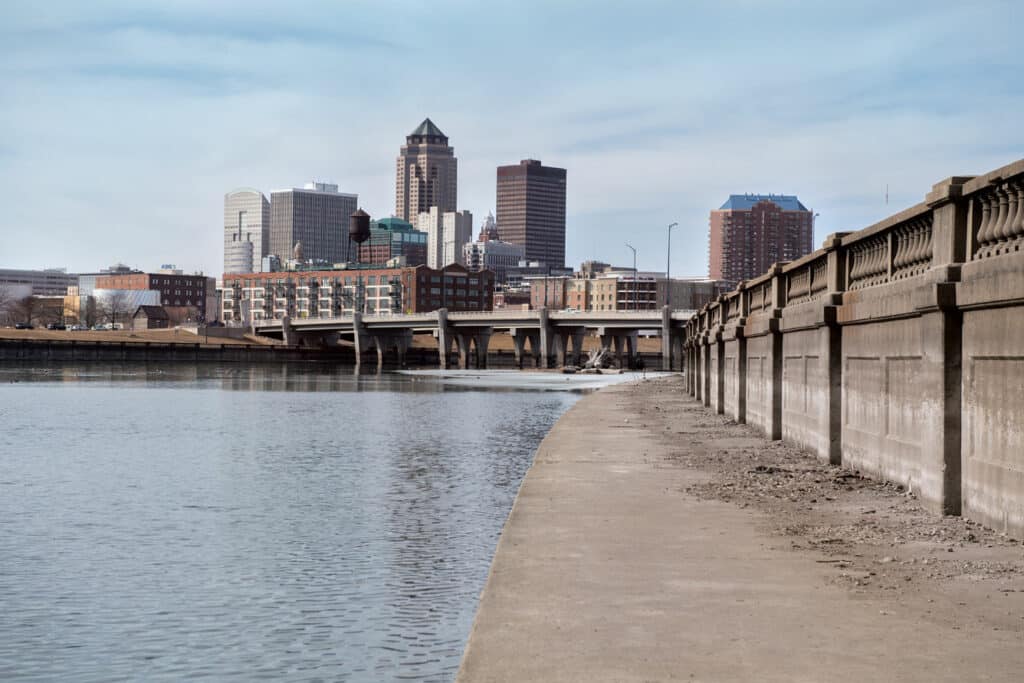
Finalist: ICON Water Trails’ Scott Avenue project launched
The recently launched Scott Avenue portion of the ICON Water Trails project improves the safety and recreational potential of the Scott Avenue dam site. Stephanie Oppel joined ICON Water Trails as its new executive director on Sept. 25, taking the reins of the $125 million initiative that will connect 80 sites along 150 miles of rivers and creeks in Central Iowa. The project took a big step forward with the groundbreaking of the Scott Avenue site, which includes the mitigation of the low-head dam and introduction of whitewater features. It is the largest of the first phase of projects and is intended to create a safer, more user-friendly area for activities like kayaking and fishing.
Question: What aesthetic improvements can people expect when work on the Scott Avenue Dam site is complete, and what enhancements will make the area safer and able to connect to the greater ICON Water Trails project?
Answer: Improvements to Principal Point at the Scott Avenue dam include two in-water drops that allow for passage through this stretch of the river, enhanced fish habitats, and an educational plaza. Aside from these amenities, a tremendous amount of work is being done on the uplands portion of the site to restore floodplains and provide the proper grading for improved user access. In total, this site will create a unique nature connection against the urban backdrop of the Des Moines skyline. This is the first of ICON’s signature downtown sites to begin construction, and because it is located at the confluence of the Des Moines and the Raccoon rivers, it represents and embodies the connectivity of ICON’s system as a whole.
Question: Iowa’s waterways face a host of environmental and accessibility challenges. For a project like ICON to be successful and widely used by the public, what changes are needed in terms of the way Iowa treats, cleans and interacts with its waterways?
Answer: We see ICON as a catalyst for change in regard to conservation broadly, and water quality more specifically. It’s no surprise that stewardship has a direct relationship to value — i.e., we take care of what matters to us. By investing in our waterways, building partnerships up and downstream, and elevating awareness around our natural resources, we are ultimately creating increased opportunities for Iowans to engage with their surrounding environment and develop a conservation ethic.

Finalist: Community Foundation C3 Center opens
The C3 Center is a new community hub serving the entire nonprofit and charitable giving sectors and will bring diverse groups and perspectives together to make our community better together. The Community Foundation of Greater Des Moines opened the C3 Center in May 2023 as a central hub to the region’s nonprofit and charitable giving communities. The foundation purchased the former Tri-City Electric building behind its headquarters in the Finkbine Mansion and broke ground on the project in May 2022. The new center offers space for nonprofits to use for training, board meetings and more.
Question: How has the C3 Center been used so far in 2023?
Answer: The C3 Center was strategically crafted as a hub for our nonprofit and charitable giving sector, where connections are made, collaborations form and community is built. A hub that absolutely advances our mantra that we’re simply better together. Since its opening in the spring of 2023, the C3 Center has seen the convergence of ideas, training and leadership development, fostering a collaborative environment for the nonprofit sector to flourish. Throughout the year, the C3 Center has been a vibrant venue, hosting a diverse array of events for our community partners. We have hosted educational training courses for professional advisers, such as one focusing on relationships with multi-generational clients. We have also hosted trainings for nonprofits in our community such as training about legal essentials for nonprofits. And we’ve celebrated the graduation of the African American Leadership Academy within its wall. Beyond its role as an event space, the C3 Center also provides valuable office space for the Community Foundation staff and serves as the home for nonprofit tenants, including Lead DSM, the Directors Council and the Greater Des Moines Public Art Foundation. We can’t wait to see how the space will continue to grow for the community.
— Kristi Knous, president, Community Foundation of Greater Des Moines
Question: How will a central hub for nonprofits and charitable organizations support the region’s development and progress overall? What opportunities does it create?
Answer: Establishing a central hub for nonprofits and the broader community of stakeholders holds immense potential for significantly contributing to the development and progress of a region. We always say, we’re not going to have a strong community if we don’t have a strong nonprofit sector. By providing a dedicated space to convene stakeholders to have critical conversations, promote professional growth and learning, and foster leadership while creating lasting connections, the C3 Center serves as a catalyst for positive change in and for our region.
This central hub serves as a focal point for the information and idea sharing, playing a crucial role in raising awareness about various charitable initiatives and causes. The C3 Center provides a space for organizations to facilitate the sharing of data and insights among nonprofits, leading to better-informed decision-making. Nonprofit leaders can leverage each other’s successes and learn from challenges, enhancing their overall impact. Collaborative initiatives also contribute to capacity building among nonprofits, where the sharing of best practices and training programs collectively work toward improving effectiveness and efficiency.
— Kristi Knous, president, Community Foundation of Greater Des Moines
Business Leader — Newcomer of the Year
This award recognizes a business leader who is new to the community or in a new position of leadership in their organization who has already and will continue making significant contributions to the community.
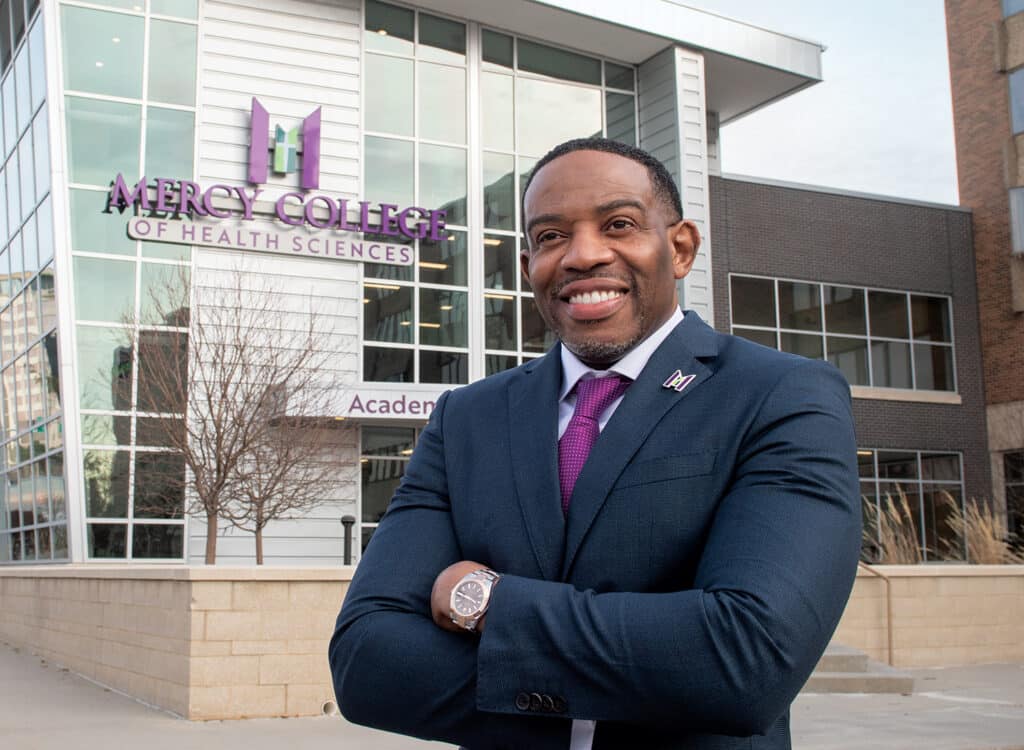
Winner: Dr. Adreain Henry, president, Mercy College of Health Sciences
Henry is now in his second year as president and CEO of Mercy College of Health Sciences after previously serving as chief academic officer and associate provost at Hallmark University in San Antonio, Texas, where he had also been dean of arts, sciences, graduate studies and research. An avid scholar, Henry has seven degrees, including a pair of master’s degrees and a pair of doctorate degrees. He also served more than five years on active duty in the U.S. Army as an optometry officer and practiced optometry in the private sector for six years before being recruited into the higher education field.
Question: As hospitals, clinics and specialty care facilities nationwide experience a skilled worker shortage, what are some of the strategies that Mercy College of Health Sciences is employing to help fill that demand?
Answer: Mercy College of Health Sciences provides 17 academic pathways in health care from certificate programs to master’s degrees. Our approach to addressing the skilled worker shortage centers on three key priorities: innovation, collaboration and excellence. We strive for innovation through the integration of cutting-edge technologies and advanced teaching/simulation methods that enrich the learning experience for our students. Recognizing the importance of collaboration, we actively seek partnerships with health care organizations, government agencies and educational institutions to collectively address the workforce shortage. Mercy College is proud to host the largest nursing program in Iowa, a testament to our strong affiliation with MercyOne and the ample clinical rotations available to our students. At the core of all our efforts at Mercy College lies an unwavering commitment to excellence, both for ourselves and the individuals we serve.
Question: What is your vision for the future of Mercy College’s academic program and campus footprint in Des Moines?
Answer: The vision of Mercy College of Health Sciences is to emerge as a prominent local and regional leader, shaping students into health care professionals dedicated to embodying and expanding the ministry of healing. We aspire to be the preferred institution known for fostering a culture of unity, shared goals and unwavering dedication to the success of our students under the banner of “One Team, One Goal, Devotion to Student Success.”
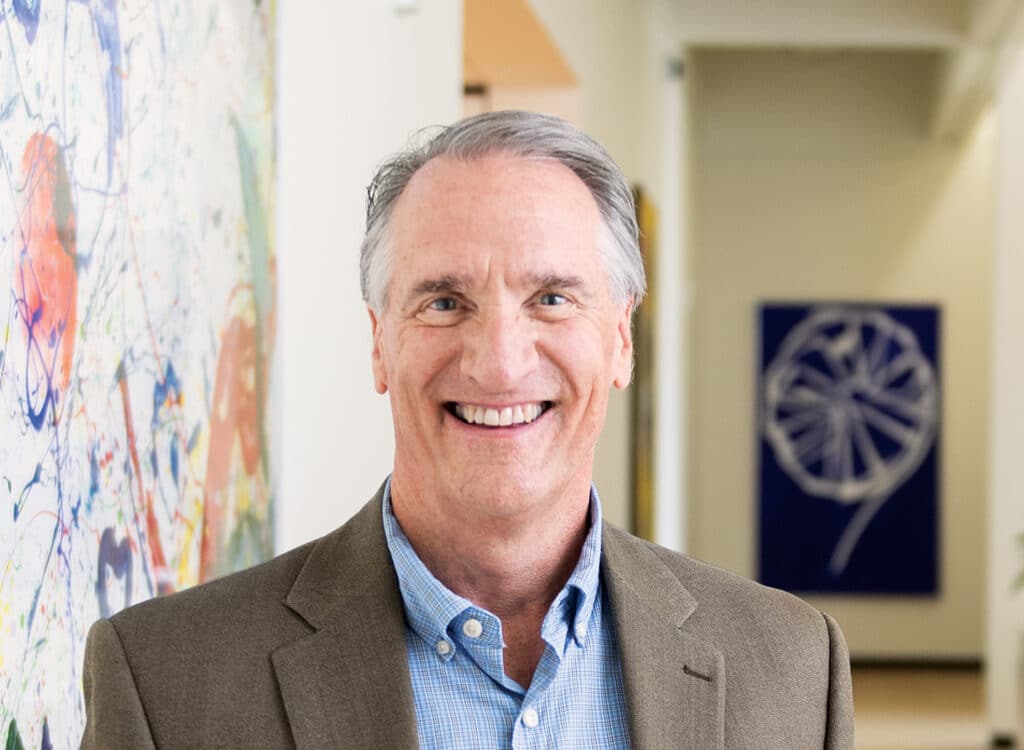
Finalist: Dave Keith, president of insurance solutions, Wellabe
Keith will become the CEO of the recently rebranded Wellabe, formerly American Enterprise Group, in January of 2024. Keith is currently president of insurance solutions. Keith joined Wellabe in 2016, serving as chief operations officer for four years before moving into his current role where he oversees sales, product solutions, customer service, technology and innovation teams, and AE Ventures, the insurtech arm for Wellabe. Before joining Wellabe, Keith was the founder and CEO of se2, a third-party technology solutions provider and administrator for life and annuity companies. He holds a bachelor’s degree in business and economics from Saint Mary’s College of California.
Question: AI integration is being discussed in nearly every industry. What are the core practical applications for AI in the insurance and insurtech industries, and how will business and individual consumer clients feel its impact?
Answer: AI can be leveraged in many ways. This includes how we operate our business and utilizing AI to enhance transaction processing. By using both digital and data at the point-of-sale, we can help create a seamless experience for both agents and consumers, tailoring our approach to how they want to transact with us. This is important for meeting and exceeding expectations in a rapidly changing environment. When it comes to AI capabilities in the form of advanced analytics, we improve complex decision making in the various business functions like claims, underwriting, etc., to help drive better outcomes.
Question: What’s your strategy and philosophy for assuming the top leadership role at an existing company?
Answer: I like to summarize my taking over the CEO position of a thriving company in one phrase: “Maintain course, full speed ahead.” Wellabe has been on a path of growth and transformation the last few years, and we are starting to hit full stride. Moving to a unified brand has removed some of the natural inhibitors that prevented a “one-team, one focus” mindset as well as provided us an opportunity to increase our visibility and tell our story more effectively.
My strategy is to leverage our strengths and competencies, which include our talent, operating capabilities and position in the market to be the most trusted provider of health and wealth solutions in an increasingly connected world.
I believe we should strive to be a high-performing team, striking a balance of planning for the long-term while nimbly responding to the changes in the short-term. We also need to be good stewards of the company and continue to uphold the principles of a mutual company. We will do this by one, establishing purpose to all parties that intersect with Wellabe – employees, members (our customers) and partners, and two, cementing long-term thinking and value for our policyholders. We will achieve these principles through discipline, innovation and thought leadership.
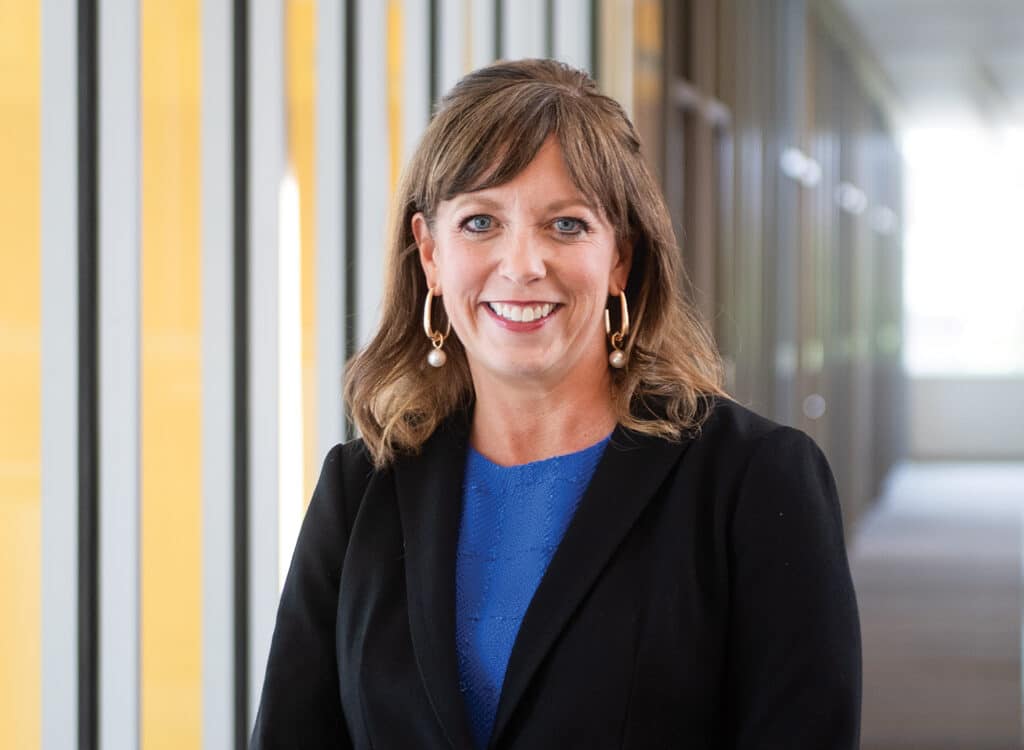
Finalist: Amanda Wanke, CEO, DART
Wanke is the new CEO of the Des Moines Area Regional Transit Authority (DART), the state’s largest public transit agency. The 46-year-old returned to the transportation agency after she left DART in October 2022 to join New Flyer and MCI, a bus and coach manufacturer. She replaced Elizabeth Presutti, who left earlier this year after 11 years as CEO. Wanke first joined DART in 2015 as chief external affairs officer and was named COO and deputy CEO in May 2020.
Question: You’ve returned to DART and took the position of CEO during a time of fiscal uncertainty, possible service reductions and a franchise fee proposal with the city. How could a service reduction affect overall economic development in the region?
Answer: We are all very familiar with the record-low unemployment rates in our region that are making it hard for employers to recruit and retain workers. DART provides 3.2 million rides each year, and 57% of our riders are using DART to get to work. In addition, we know the majority of people currently riding DART have household incomes of $30,000 or less. Let’s just estimate, conservatively, that we help 3,500 people get to work and earn $30,000 per year. That is more than $100 million of economic impact to Central Iowa.
Conversely, consider the negative economic impacts if those riders can’t get to their jobs, medical appointments, classes, child care, or other services that are essential to their lives. It is well-proven that public transportation offers a direct correlation to healthy and thriving communities. Cutting service directly affects the lives of our residents and makes it harder for our region to compete for talent.
Question: Transit organizations nationwide are modernizing fleets to meet carbon reduction goals and studying multimodal transportation strategies including light rail, autonomous vehicles and rideshare. What do you see as the future needs of the Des Moines area, and where is that investment likely to occur?
Answer: The City of Des Moines Climate Action Plan aims for a carbon-free city by 2050 and calls out the need to “make it easier for community members to travel by transit” to achieve that. In order to make traveling by transit easier, good, frequent service is critical. It’s important to note, in the midst of the funding conversations we’re having, the hours of public transit service provided in the region have grown only 1% since 2009, while the population has grown 24%.
At the same time, other communities are choosing to invest in transit to reduce carbon emissions and to remain competitive as they seek to attract talent and jobs to their communities. For example, Omaha added Bus Rapid Transit several years ago and is now in the process of building a streetcar; Rochester, Minn., is building a $150 million Bus Rapid Transit project; and Iowa City is testing free fares and partnering with New Liberty, a community approximately 45 miles to the east, to study adding Bus Rapid Transit to connect the two communities.
If we want to achieve carbon reduction goals, then investment in public transit service is essential.
Cultural Leader — Newcomer of the Year
This award recognizes an individual who is new to the community or in a new position of leadership in a cultural or nonprofit organization who has already and will continue making significant contributions to the community.

Winner: Ian Roberts, superintendent, Des Moines Public Schools
Roberts became the superintendent of Des Moines Public Schools, the largest school district in the state, in July. He taught special education before he began to move through the administrative ranks; his last stop before Des Moines was as a superintendent in Pennsylvania. The 2000 Olympian in track and field for Guyana has degrees from Coppin State, St. John’s, Georgetown and Trident universities. In Iowa’s largest school district, his tasks include responding to enrollment declines and repairing the district’s ties with leaders that frayed during the COVID-19 pandemic.
Question: How would you describe DMPS’ efforts related to local workforce development and retention and getting students career-ready in today’s job market?
Answer: Des Moines Public Schools continues to prioritize its course offerings and our Future Program, where we prepare students for postsecondary success in college and career. As a practice, we continuously examine the workforce needs of the Des Moines community, and Central Iowa region, with the goal meeting and exceeding those needs. As Iowa’s largest, most culturally, linguistically, and economically diverse school system, our graduates are exposed to a rich multicultural learning experience, world-class career and technical education program with a rigorous academic suite that prepares them for immediate impact upon entering the workforce. Our DMPS graduates are poised to play an integral role in serving as the largest pipeline for Central Iowa’s workforce. One example is our commitment to health services and medical field certifications such as Certified Nursing Assistants and medical technology positions. Our recent unprecedented partnership with Polk County [Board of ] Supervisors, Des Moines University, and other health service partners and universities will allow for our students to expand their skills in a state-of-the-art simulation facility to ultimately meet the increasing needs in health care. Additionally, our Central Campus offers more than two dozen options for workforce certifications, all of which are in high demand today.
Question: What’s your assessment on the district’s relationship with state and local elected leaders, and what are some of the key areas you intend to address with state leadership?
Answer: Recognizing that the success of Des Moines Public Schools is contingent upon a symbiotic relationship with state and elected officials that is characterized by mutualism, authentic collaboration and an aligned vision, the superintendent and his executive cabinet continue to approach the relationships with the state and elected officials through a spirit of collaboration and a student-first mentality. We believe that every adult in the state of Iowa and City of Des Moines values quality educational opportunities for all of our youth. With this in mind, our intentionality to creating a future-ready Des Moines Public Schools system is anchored in strengthening, and where necessary, cultivating meaningful relationships and partnerships with the Department of Education, state and local elected officials throughout the length and breadth of Iowa.
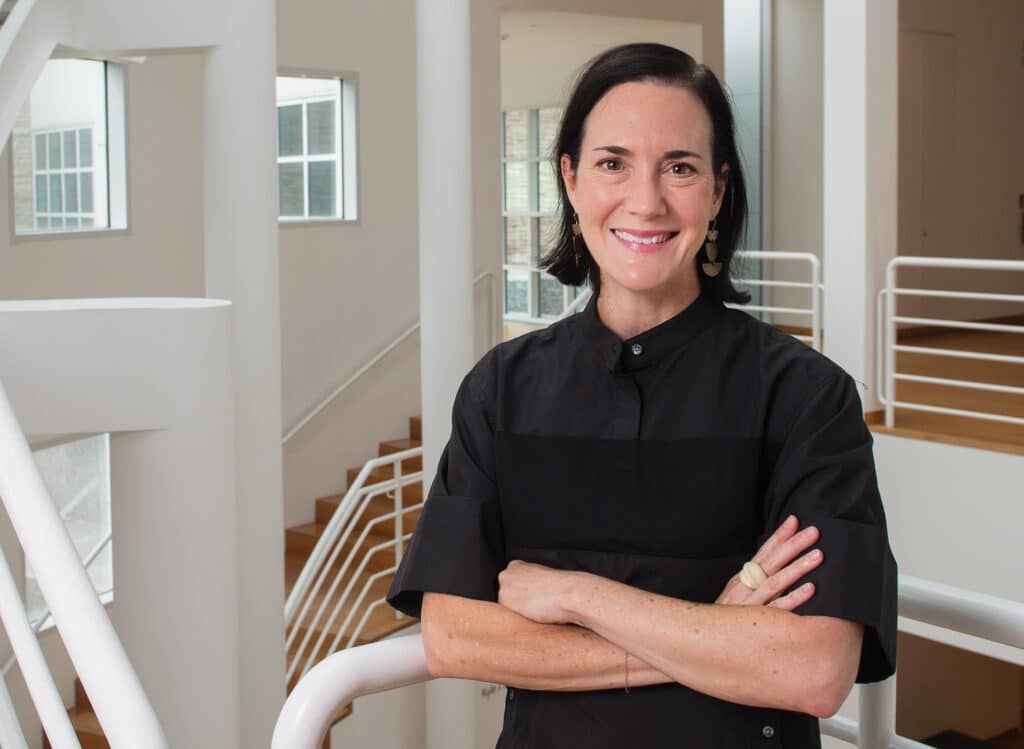
Finalist: Kelly Baum, director, Des Moines Art Center
Baum became the director of the internationally recognized Des Moines Art Center in May of 2023. She had spent much of her career as a curator at institutions in Texas, New Jersey and New York before coming to Des Moines to replace Jeff Fleming, who was the art center’s director for 25 years. As she settled into the new job and new locale, she said she appreciated outdoor-recreation and cultural opportunities in Central Iowa. With the art center marking its 75th anniversary this year, she is focused on expanding its visibility and ensuring its vitality for generations to come. Baum noted she has an especially good working relationship already with Des Moines Parks and Recreation.
Question: You told the Business Record in August that you consider yourself the Des Moines Art Center’s “primary caretaker.” What does that encompass?
Answer: I was initially inspired to think about leadership in terms of caretaking after reading a 2020 interview with curator and director Yesomi Umolu, who brilliantly summarized the need to incorporate “care” into the act of managing teams and guiding institutions. Serving as the art center’s executive director involves caring — literally — for our art collection, our buildings, our finances, our visitors and, just as importantly, our staff. I arrived at the art center with a staff-forward, organizational-culture first mentality, and I try to act on it every day. What this means in practice, specifically for staff, is working hard to cultivate an environment of inclusion, offering professional development and educational opportunities, and, whenever possible, expanding and improving material benefits, among others.
Question: You said the Des Moines Art Center was on your radar for a while. What does this art center have that makes it rank, as you’ve previously said, one of the best in the country?
Answer: The art center has built what I consider an enviable collection of art — a collection that any museum in the country would feel lucky and privileged to own. Some of the most important works in our collection were acquired in the 1960s, 1970s and 1980s — the art center took a risk embracing them when they did, putting them ahead of many other institutions. The art center is also one of the few museums in the country to feature both an art school and a sculpture park. Equally exceptional are the art center’s buildings, designed by three of the most innovative architects of the 20th Century.

Finalist: Jerrica Marshall, executive director, the Directors Council
In July, Marshall became the first executive director of the Directors Council, a coalition of leaders whose mission is to improve conditions in neighborhoods they serve through systemic change. Marshall began her professional career working with high school students who had significant behavior problems. A year later, she began working as a mortgage specialist, assisting customers having difficulty paying their mortgages. Marshall has been a communications coach; diversity, equity and inclusion chair at a large financial institution, and at the Greater Des Moines Partnership, worked as a downtown events and placemaking manager.
Question: Since taking the executive director’s role in July, what have you determined are your top priorities or new initiatives for the Directors Council?
Answer: As the executive director, my primary focus lies in delivering an updated version of our One Economy report, aligning it with our One Economy State of Black Polk County and the One Economy Blueprint for Action. This revised report is pivotal as it establishes a baseline for understanding racial inequity in Polk County. It will empower the Directors Council to formulate targeted policy goals aimed at enhancing our community’s advancement and addressing these disparities.
Question: How would you assess the state of Des Moines’ businesses owned by people of color in the current market conditions?
Answer: The evaluation of businesses owned by people of color in Des Moines, considering current market conditions, underscores the vital necessity for robust business support services. The One Economy report prominently identified this need, emphasizing the importance of beginning with trusted community providers to lay the groundwork. This insight steered the direction of our spin-off entity, the One Economy Financial Development Corporation (OEFDC). The OEFDC is dedicated to facilitating access to essential business services and providing small personal and business loans. These initiatives are designed to empower growth and facilitate expansion among entrepreneurs within our community.
